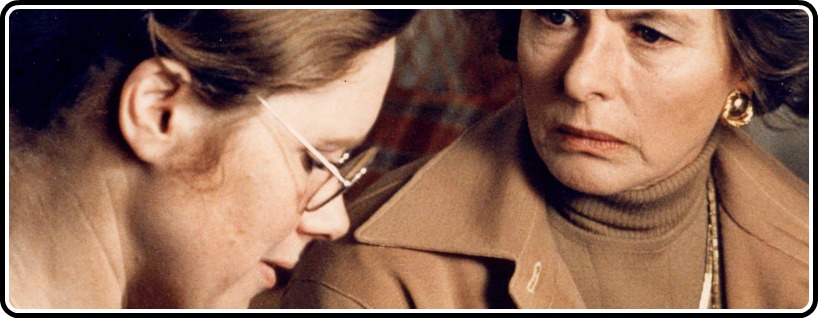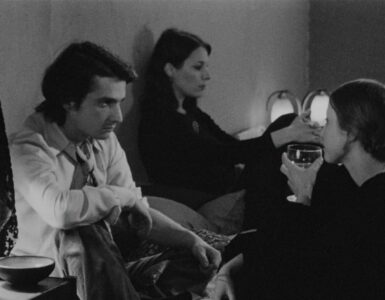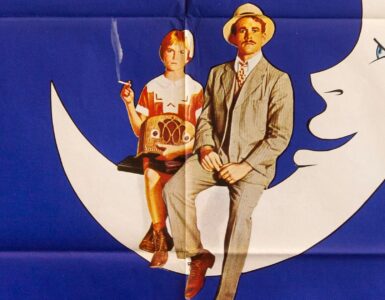Throughout the history of film, there are directors cinephiles wished would have had a chance to work with certain actors, certain actors with certain writers, and other dream collaborative efforts. However, when the likes of director Ingmar Bergman and legendary screen star Ingrid Bergman joined forces for their one collaboration, this dream pairing not only became a truly great piece of work, but one of the best efforts either of them released throughout their career.
In 1978, the two teamed up for their one and only collaboration, the brilliant Autumn Sonata, a film that, now on Blu-ray thanks to The Criterion Collection, is getting yet another moment to stand in the spotlight this underrated masterpiece truly deserves.
This crackling melodrama tells the tale of a successful pianist, Charlotte (Bergman), who comes to visit her daughter, Eva (Liv Ullmann), who herself is beyond excited to see her mother once again. However, when she reveals to her mother that her other daughter, the mentally disabled Helena, is also in the house, the drama slowly begins to pick up, until the picture becomes a boiling melodrama filled with pent up frustration and parental neglect. And while the narrative itself holds within it an intense and white hot sense of familial drama, the performances are truly the stars of this picture.
Ingrid Bergman, in her final feature film performance, gives easily one of her greatest, and truly career defining, performances. Taking on the role of Charlotte is a tough prospect for any thespian taking on this type of role, that of a mother who has been not only emotionally selfish opposite her family, but emotionally violent towards her two daughters, tough to both subtly bring to life and make at all emotionally connectable, and yet she is able to turn this into as great a send off as any actor or actress could hope for. Opposite Ullmann she is tasked to carry the much of the film in a handful of scenes, but while the final act veers towards the narrative and dramatic bombast, both actresses make the quieter of moments all the more emotionally devastating. Never one to let up on the palpable melodrama, both Ullmann and Bergman thrive here, finding an Oscar nomination for the latter, her final nomination, capping off one of film’s greatest on screen careers.
It also feels, oddly enough, as if this is a performance so vital to someone like Bergman, that it becomes all the more devastating. A woman who herself left her family to star in a handful of films for director Roberto Rossellinni, a man she ultimately married, there is such a truth to every word Bergman utters here that it’s either the stuff of an all-time great performance, or the stuff of an actress mining from the deepest sense of tactile regret one could imagine. Ullmann is, again, just as great here, really pairing off well with Bergman, taking on the legendary actress and not shying away from her biggest and most dramatic choices. The two go blow for blow here, all culminating in a film that is one of the best to ever come from any party involved.
And that includes the legendary auteur behind the camera. Oddly one of Bergman’s lesser known masterpieces, the film opens up with a voice over from co-star Halvar Bjork, itself setting the film up as something of a staged theater piece. This stylistic choice hints at a director wholly uninterested in turning this film into anything more than a dramatically bombastic chamber drama, but also, that very choice proves to be a mark of a director entirely assured in his aesthetic choices. While much of the film is shot indoors, often tightly framed on each actor’s face or quietly spacious shots of vast rooms truly proving the isolation of our co-lead Eva, the film is as cinematically challenging and visceral as any film Bergman would make during this period of his career. The static shots are framed with as much empty space between those caught within the frame as humanly possible, not only distancing themselves from one another but from the viewer as well, and the cinematography here is warm and inviting, oddly adding to a drama that features icy cold characters but also some boiling hot drama. The film is a real Masters class in building tension through narrative instead of through simple camera tricks. But the tricks are out in full force here, ranging from the film’s use of close ups in the final act, or its use of fades throughout, ultimately culminating in one of Bergman’s most breathless works.
Inherently a meditation on mother-daughter relationships, there isn’t much in the way of unspoken drama, ultimately finding a film with a screenplay that almost feels too verbose for its own damn good, but it’s also a genuinely heartbreaking look at a mother and daughter who have never seen eye to eye except in the fact that deep down, they both do truly care for one another. It’s simply one of the best film, any party involved, ever truly got behind.
And this new home video release is justifiably stacked. The transfer here is absolutely breathtaking, breathing new warmth into a film whose cinematography is as vital to its success as you’re bound to see. Audio wise, the film comes with both a Swedish and an English dub track, both of which are oddly great in their own way. The English dub is admittedly mixed oddly (a tad too loud), but it isn’t without its own merits, as many of the English dubs on Bergman releases have been throughout the films home video lives. Peter Cowie brings major credibility to the release thanks to a must-listen commentary track, and a nearly four hour long making of documentary really amps up this release’s depth. Toss in interviews with the likes of the film’s two stars and a Bergman introduction, and you have a release that again has a chance to make its way into the top five home video releases of 2013.






![Bergman Island (The Criterion Collection) [Blu-ray]](https://criterioncast.com/wp-content/uploads/2022/11/bergman-island-the-criterion-collection-blu-ray-400x496.jpg)
![This Is Not a Burial, It’s a Resurrection (The Criterion Collection) [Blu-ray]](https://criterioncast.com/wp-content/uploads/2022/11/this-is-not-a-burial-its-a-resurrection-the-criterion-collection-blu-ray-400x496.jpg)
![Lars von Trier's Europe Trilogy (The Criterion Collection) [The Element of Crime/Epidemic/Europa] [Blu-ray]](https://criterioncast.com/wp-content/uploads/2022/11/lars-von-triers-europe-trilogy-the-criterion-collection-the-element-of-400x496.jpg)
![Imitation of Life (The Criterion Collection) [Blu-ray]](https://criterioncast.com/wp-content/uploads/2022/11/imitation-of-life-the-criterion-collection-blu-ray-400x496.jpg)
![The Adventures of Baron Munchausen (The Criterion Collection) [4K UHD]](https://criterioncast.com/wp-content/uploads/2022/11/the-adventures-of-baron-munchausen-the-criterion-collection-4k-uhd-400x496.jpg)
![Cooley High [Criterion Collection] [Blu-ray] [1975]](https://criterioncast.com/wp-content/uploads/2022/11/cooley-high-criterion-collection-blu-ray-1975-400x496.jpg)